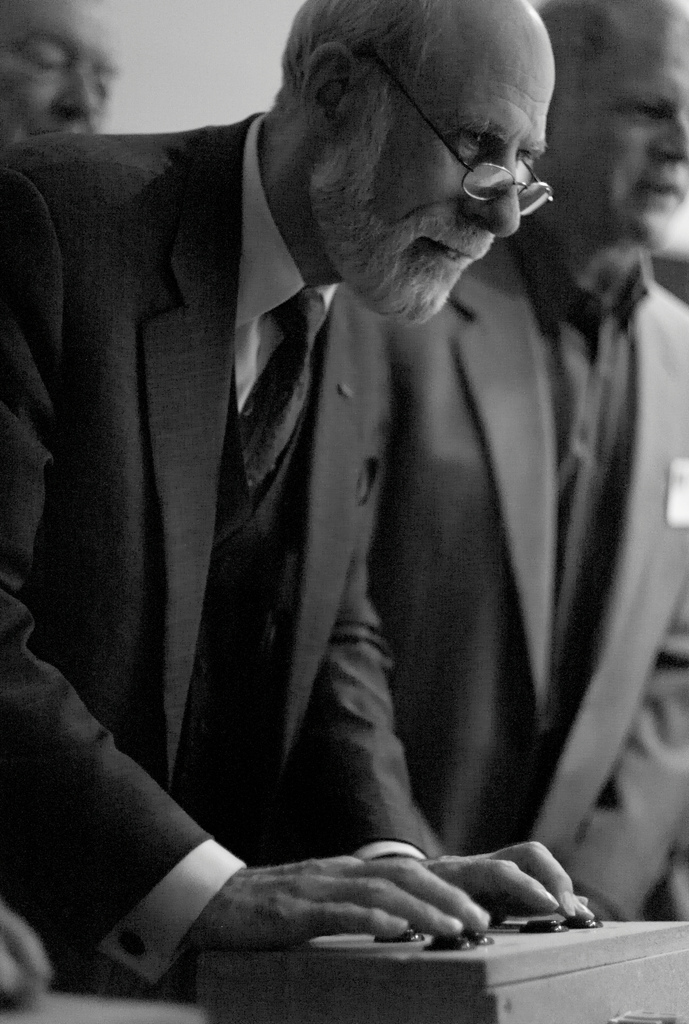What's troubling Vint Cerf? Five-hundred year old WordPerfect files and a fifty-year trip to the cosmos, that's what.

Vint Cerf has a problem: the star Alpha Centauri is too far away. He wants to get a good look at it, but at 4.37 light years from the sun, it might take a while. He’s not too worried, though, because he’s designing an interplanetary internet with Google. On Thursday in Washington, D.C., Mr. Cerf described the outer-space-net and some other personal projects to an assembly at Georgetown University, part of the National Medals Foundation’s “An Evening With” series.
Mr. Cerf has been awarded more medals than he probably knows what to do with. I guess that happens when you get credit for inventing the internet - in 1974, Cerf and Robert Kahn co-authored a paper for the IEEE titled “A protocol for packet network intercommunication.” Forty-some years later, four billion humans are piggybacking their idea into five billion daily YouTube views, a three-hundred-billion dollar digital advertising market, and a few thousand mean-spirited and contradictory Tweets by a President.In his discussion at Georgetown, the three-piece-suited Mr. Cerf reflected on those early days when they were still figuring out how the internet would work. Back then, he recalled, they thought of it as “the stupid network,” because it didn’t matter what information was being transmitted - the network would treat it all the same way. It was a revolutionary idea.
Reminiscing about the salad days transitioned into thoughts on the current state of the information age, nudged along by a line of questioning by the Washington Post’s Brian Fung. Mr. Cerf’s thoughts didn’t need prodding. His mind jumped from idea to idea without much provocation, articulating each of their complexities effortlessly and with the comprehension of a once-in-a-generation genius.From the creation of the internet, the discussion routed from point to point through security & cryptography, "the internet of things,” personal privacy, artificial intelligence, and the preservation of data over centuries. Unlike other “experts,” Mr. Cerf didn’t shy away from any uncomfortable topics, preferring instead to engage the most challenging questions with the most thoughtful answers. On Bitcoin, he advised: “Run away!” On security: “I tried to get Google to change the name of Android to Paranoid.” People need to know about the vulnerabilities of technology, he said.
Whether or not data will age well is a problem he’s been wrestling with. In a TEDx presentation in Rome several years ago, he asked the audience to think of how humans in the 22nd century will know what the hell we were doing in the 21st. Will they have access to the hardware and software required to read the unfathomable amounts of data we’re creating? At Georgetown, he lamented that he couldn’t pop an old floppy disk into his modern MacBook to read his wife’s historical WordPerfect recipes. He proposed a doctrine of fair use for software preservation and asked what kinds of institutions will be around long enough to maintain the data. Historically, he noted, the longest histories have belonged to universities, libraries, breweries & wineries, and the Church - so which of them is up to the task?
Orbiting back around to his thoughts on the interplanetary internet, Mr. Cerf described how he had come up with an idea for “store and forward” networking so that messages could be transported to the Mars Rover. Apparently, the speed of light is way too slow for the data he wants to send. My own problems of time and distance shrunk proportionately. Before arriving at the event, I had crossed the two-hour mark on my normally 45-minute drive into the city, all along the way honking and cursing and scowling at every pedestrian moving faster than I was. How could this be taking so long, I wondered? A distance of just ten blocks stretched on for an hour. After listening to Mr. Cerf talk earnestly about lasers that take 50 years to reach their destination, my traffic rage suddenly seemed so... analog.
Video of the full conversation with Mr. Cerf is available on the National Medals’ website.For more of Mr. Cerf's thoughts on the importance of digital data preservation, watch this clip from CBS Sunday Morning:[embed]https://www.youtube.com/watch?v=uvob8wCMhLo[/embed]